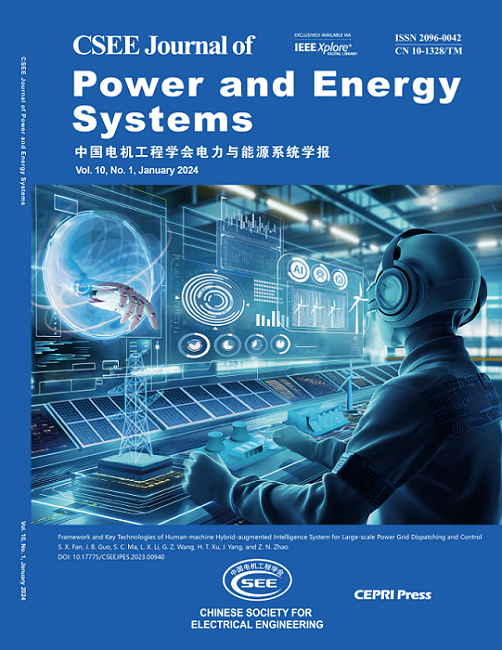Comparisons and Improvements of Key Operating Characteristics of Current Source Converter Applied in HVDC System
IF 6.9
2区 工程技术
Q2 ENERGY & FUELS
引用次数: 0
Abstract
Because of its controlled power factor and no commutation failure, current source converter (CSC) made up of reverse-blocking IGCTs (RB-IGCTs) offers broad application prospects in the field of HVDC system. Valve voltage and power operating range as the most important operating characteristics should be paid attention to but they are always contradictory. First, the relationship between valve voltage and modulation index is obtained. In particular, valve voltage of converter under the three typical modulation methods is compared, analyzed, and verified. Second, with the help of the independent control strategy and coordinated control strategy of both ends, power operating ranges of the three modulation methods are comprehensively analyzed and compared. Third, in order to solve power coupling at a low active power, the improved coordination control strategy at both ends in this paper is proposed and the relationships among active power, reactive power, DC current and phase angle difference are given in detail. Finally, a 500 kV/3 kA simulation system was built in PSCAD/EMTDC to obtain comparison results of the key operating characteristics of CSC under different modulation methods and the converter can realize unity power operation under random active power after adopting the improved coordinated control strategy, and DC current does not decrease to zero, verifying effectiveness of the coordinated control strategy.直流输电系统中电流源换流器关键工作特性的比较与改进
由反向阻塞IGCT(RB IGCT)组成的电流源换流器(CSC)由于其可控的功率因数和无换向故障,在高压直流系统领域具有广阔的应用前景。阀门电压和功率工作范围作为最重要的工作特性应该引起重视,但它们总是相互矛盾的。首先,得到了阀门电压与调制指数之间的关系。特别是对三种典型调制方式下变换器的阀电压进行了比较、分析和验证。其次,借助于两端的独立控制策略和协调控制策略,对三种调制方式的功率工作范围进行了综合分析和比较。第三,为了解决低有功功率下的功率耦合问题,提出了改进的两端协调控制策略,并详细给出了有功功率、无功功率、直流电流和相位差之间的关系。最后,在PSCAD/EMTDC中建立了一个500kV/3kA的仿真系统,对CSC在不同调制方式下的关键工作特性进行了比较,采用改进的协调控制策略后,变换器可以在随机有功功率下实现单位功率运行,直流电流不会降至零,验证协调控制策略的有效性。
本文章由计算机程序翻译,如有差异,请以英文原文为准。
求助全文
约1分钟内获得全文
求助全文
来源期刊

CSEE Journal of Power and Energy Systems
Energy-Energy (all)
CiteScore
11.80
自引率
12.70%
发文量
389
审稿时长
26 weeks
期刊介绍:
The CSEE Journal of Power and Energy Systems (JPES) is an international bimonthly journal published by the Chinese Society for Electrical Engineering (CSEE) in collaboration with CEPRI (China Electric Power Research Institute) and IEEE (The Institute of Electrical and Electronics Engineers) Inc. Indexed by SCI, Scopus, INSPEC, CSAD (Chinese Science Abstracts Database), DOAJ, and ProQuest, it serves as a platform for reporting cutting-edge theories, methods, technologies, and applications shaping the development of power systems in energy transition. The journal offers authors an international platform to enhance the reach and impact of their contributions.
 求助内容:
求助内容: 应助结果提醒方式:
应助结果提醒方式:


